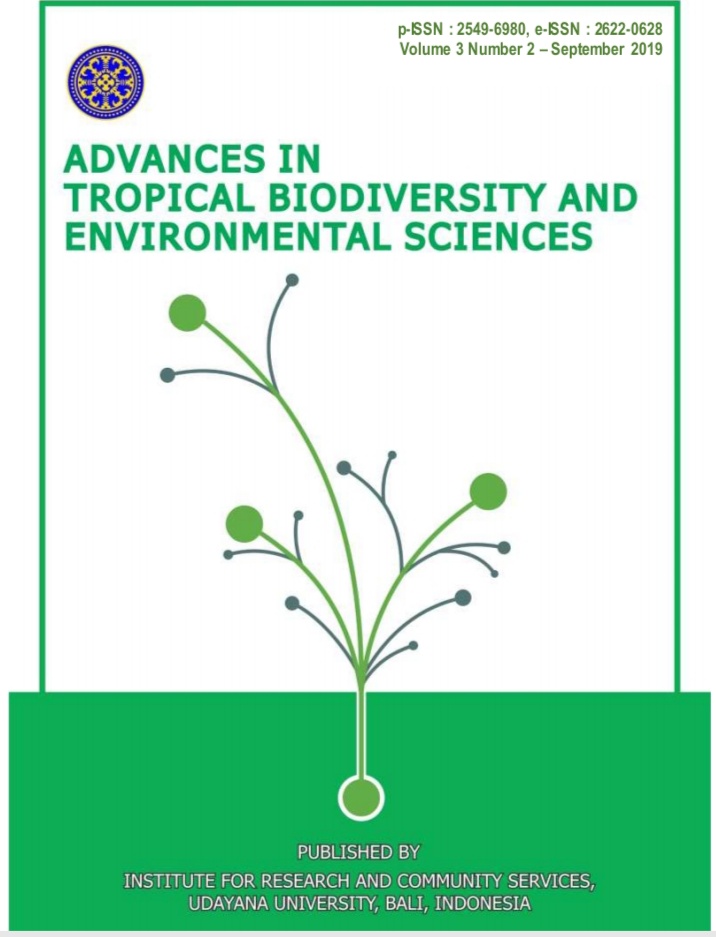The Quality and Antioxidant Content of Salted Eggs Made By Addition of Bay Leave Crude Extract on the Salting Media
Abstract
This research aims to produce salted eggs with antioxidant content from bay leave extract. The study used a completely randomized design (CRD) in which there were 3 treatments, namely, control with 0% bay leaf extract, treatment 1 with adding 25% crude extract of bay leaves, and treatment 2 with a 50% addition of crude bay leaf extract. All treatments were pressed for 14 days before testing. The parameters observed in the study were the antioxidant capacity, albumin index, yolk index, and Haugh unit. The results show that the sated eggs with the different concentration of bay leave extract contain antioxidant 4.445%, 30.853%, and 44.32% respectively, albumin index of treated eggs was lower than control, while Haugh unit of treated eggs was higher than control, and no differentiation of yolk index between the treatments. To conclude, the addition of bay leave crude extract can increase the value of salted eggs without disturbing the quality.
Downloads
References
[2] Dalimartha S. 2000. Atlas Tubuhan Indonesia, 2th Ed, 162-165, Trubus Agriwidya, Jakarta.
[3] Robinson T. 1995. Kandungan Organik Tumbuhan Tinggi. Bandung: ITB.
[4] deGuzman CC, Siemonsma JS. 1999. Plant Resources of South East Asia 13: Spices. PROSEA. Bogor.
[5] Algabri SO, Doro BM, Abadi AM, Shiba MA, Salem AH. 2018. Bay Leaves have antimicrobial and antioxidant activity. J Patogh Res. 1(1): 1-5.
[6] Javanmardi J, Stushnoff C, Lockeb E, Vivanedo JM. 2003. Antioxidant activity and Total Phenolic content of Iranion Ocimum accessions. J Food Chem, 83: 547-550.
[7] Kikuzaki H, Hisamoto M, Hirose K, Akiyama K, Taniguchi H. 2002. Antioxidants Properties of Ferulic Acid and Its Related Compound. J Agric Food Chem, 50: 2161-2168.
[8] Agustina KK, Dharmayudha AAGO, 2015. Pemanfaatan kulit buah manggis sebagai media pembuatan telur asin. Majalah Ilmiah Peternakan, 18(3): 114-118.
[9] Ledvinka Z, Zita L, Klesalová L. 2012. Egg quality and some factors influencing it: a review. Sci Agric Bohem, 43(1): 46–52.
[10] Agustina KK, Dharmayudha AAGO, Swacita IBN, Sudimartini LM. 2015. Analisis Nilai gizi telur itik asin yang dibuat dengan media kulit buah manggis (Garcinia mangostana L) selama masa pemeraman. Buletin Veteriner Udayana, 7(2): 113-119.
[11] Wang ZF, Dai C, Wang TY. 2017. A simple method to evaluate oil in salted egg. Int J Food Prop. 20(2): 1816-1822.
[12] Murtidjo BA. 1988. Mengelola Itik. Kanisius, Yokyakarta.
[13] Lailiyah A, Adi TK, Hakim A, Yusnawan E. 2014. Kapasitas antioksidan dan kandungan total senyawa fenolik ekstrak kasar alga coklat Sargassum cristaefolium dari pantai sumenep madura. Alchemy, 3(1): 18–30.
[14] Monira KN, Salahuddin M, Miah G. 2003. Effect of Breed and Holding Period on Egg Quality Characteristics of Chicken. Int J Poult Sci, 2(4): 261–263.
[15] Yadav AK, Singh SV. 2014. Osmotic dehydration of fruits and vegetables: a review. J Food Sci Technol. 51(9): 1654–1673.
[16] Kusuma E, Ruddyanto MD, Suada IK. 2012 Pengasinan Mempengaruhi Kualitas Telur Itik Mojosari, Indo Med Vet. 1(5): 645-656.
[17] Tarigan RLB, Agustina KK. 2016. Kualitas telur asin bermedia kulit manggis (Garcinia mangostana L) berdasarkan Indeks Putih Telur, Kuning Telur, dan Haugh Unit. Indo Med Vet. 5(1): 30-37.
[18] Tien R, Sugiono M, Ayustaningsih F. 2010. Ilmu Pengetahuan Bahan Pangan. Cetakan Kedua. Alfabeta.
[19] Singh RP, Panda B. 1990. Comparative study on some quality attributes of quail and chicken eggs during storage. Indian J Anim Sci. 60: 114-117.
[20] Belitz HD, Grosch W. 1999. Food Chemistry. Spinger, Germany.
[21] Winarto FG, Koswara S. 2002. Telur: Komposisi, Penanganan dan Pengolahannya. M-Brio Press. Bogor.
[22] Winarto FG. 1993. Pangan Gizi, Teknologi dan Konsumen. Jakarta: Gramedia Pustaka Utama.
[23] Romanoff AL, Romanoff A. 1963. The Avian Egg. John Wiley and Sons, New York.
[24] Stadelman WJ, Cotteril OJ. 1977. Egg Science and Technology. The AVIPublishing, Inc. Westport. Connecticut.
[25] Roesdiyanto. 2002. Kualitas telur itik tegal yang dipelihara secara intensif dengan berbagai tingkat kombinasi Metionin-Lancang (Atlanta Sp). J Anim Prod. 4(2): 77-82.
[26] Gurav SS, Deshkar NS, Tilloo SK, Duragkar NJ, Burade K. 2013. Antimicrobial and antioxidant evaluation of Flacourtia Ramontchi L. Herit. J Herbs Spices Med Plants. 19(1): 76-95.













